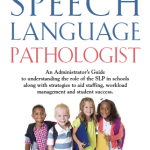Administrators: Know Your SLP’s

The biggest mistake administrators make is not getting to know their professionals. Often based on the decisions you make, things you say in meetings or even off handed comments you make it is clear to Speech Language Pathologists that you have no idea what we do, how knowledgeable we are, the resources we need to do their job better or even areas we address. When making big decisions especially those that involve procedure get your staff involved. You might be surprised at what your staff can offer. Teachers and other professional staff such as SLP’s can often be a feather in your cap if you listen to them rather than immediately disagree with them.
Learn the roll of every staff member and professional in your building or school. You never know when someone might have special training or experience to get you through a rough situation. Listen to what your staff has to say even if it’s an opinion. Successful administrators and school boards cannot have a myopic point of view. I’ve seen this happen and it does not create a strong, successful school system.
SLP’s are extremely knowledgeable. Our expertise goes beyond articulation therapy. We have training that goes way beyond academics. We know how the brain and body function together. We can pick out specific difficulties in children that can make life long differences if not remediated. We know about auditory development (not just hearing) and what happens to students who have difficulty with auditory processing, discrimination etc. We know immediately when your school system has a poor phonics program. We work on language development with severely autistic children, children with non-verbal learning disabilities and everything in-between. We work with children who have specific learning disabilities with average cognitive skills and those children who are severely learning impaired with low cognitive skills. Unless you’ve studied higher level language development you don’t have a clue it’s missing until it is almost too late. This list only hits the tip of the iceberg. I could go one and on ….. but I think you get the point.
Get to know you SLP’s and other professionals. Ask the questions and listen to them. It will only make you a better administrator.
Teresa
Understanding higher order language skills
This article was originally posted in Your Middle Schooler: A Unique Age in February 2008. It was the first in a series of articles on Higher Order Language Development. The importance of higher order language development and what to do to foster higher order language development. In following articles I will address strategies to foster understanding and use of higher order language development. If you have a specific concern in this area contact me.
Develop Those Higher Level Language Skills!
During the middle school years, students are beginning to develop higher level language abilities. Most students do this so naturally we do not even notice. Teachers do their best to help students gradually develop mature language skills. However, students with language disabilities or just weak academic habits may have difficulty acquiring these higher level language skills.
What are some higher level language skills?
• Development of mature vocabulary
• Understanding of word relationships such as homophones and homographs
• Understanding and use of figurative expressions
• Organization of mature sentences (oral and written)
• Understanding and use of mature grammatical structures (oral and written)
• Ability to draw conclusions and inferences
• Ability to paraphrase and rephrase with ease
• Ability to reason
• Looking at things from another’s perspective
Concerns when Students do not attain higher level language skills.
• Difficulty with comprehension (oral and written)
• Unable to understand and make connections and associations
• Difficulty understand jokes, riddles and humor in general
• Inability to organize language
• Writing skills will suffer
• Poor problem solving skills
• Inability to be flexible with language ( I will explain more about that later)
• Academic success is effected
• Immature pragmatic abilities (social speech skills)
Misunderstandings in social situations
Many simple activities can help foster development of higher level language skills. Keep an eye on my blog. I will continue to provide information and suggestions for intervention. If you need me to address an area ASAP or you have specific questions drop me a comment.
Teresa
Hearing health in children and adults
http://www.examiner.com/speech-pathology-in-boston/earbuds-proceed-with-caution
New article on Examiner focusing on proper use of earbuds to maintain good hearing health. You might want to consider bring this up at your school in May, as part of better speech and hearing month.
Teresa
Chronic Otitis Media and Risk of Reading Failure
This article was originally published in “Your Middle Schooler: A Unique Age” in 2008. I try to include information on hearing history in every evaluation I perform. Not just for curiosity but because I really feel early hearing history plays a significant roll in language development and “learning to listen”. Last time I asked audiologists were not supporting this correlation. I hope things have changed. Because it is not a big issue in audiology, I have a hard time getting most administrators to accept this as an issue. As long as the kids pass the school screening, life is good. If universal supports were put in place around hearing and acoustics in general imaging the problems that could be avoided.
WEDNESDAY, JANUARY 16, 2008
Chronic Otitis Media and Risk of Reading Failure
While this paper does not specifically pertain to Middle School Students, I would have to guess that approximately 60-70% of my middle school caseload, at any specific time, have a history of Chronic Otitis Media also known as ear infections. Many of these students also have associated reading difficulties or history of reading difficulties.
.
Chronic Otitis Media and Risk of Reading Failure
by Teresa Sadowski MA/SLP-ccc
May 2007
Having worked as a Speech Language Pathologist for over 20 years, it always amazes me the number of students on my caseloads, that have a history of chronic otitis media or a history of excessive fluid in the middle ear. Perhaps it is not that that unusual. Statistics show that 70% of children will have at least one bout of otitis media commonly known as an ear infection before the age of 3. For many children ear infections are a recurring problem. It would not matter what level I was working with. I can state with some certainty that at least 50% of my public school caseload at any given time had a significant history of fluctuating hearing loss early on due to fluid in the middle ear because of chronic ear infections or chronic allergies. Let me make some generalizations about these kids. During my preschool experience, the students usually presented with articulation difficulties, had trouble with rhyming, had trouble remembering the right words to songs and many of them always seemed one step behind when responding verbally. Preschoolers may still be dealing with occasional ear infections, effecting hearing acuity and requiring treatment. During my kindergarten through 5th grade experience, the underlying language issues demonstrated by these students developed into actual reading problems. Simple articulation errors usually resolved but difficulty with phonics emerge. These students usually receive additional support services, specific reading instruction and tutoring. Often even with specific reading instruction, these kids were slow to have any kind of success with reading. During grade school, hearing usually stabilizes but it is not unusual for these students to still suffer with an occasional ear infection or fluid filled ears (especially during allergy season). In middle school my students continue to struggle with reading, they can usually decode consonants but vowels might be a problem. Difficulties with reading comprehension become very obvious. Most also demonstrate poor fluency when they read. These students have not naturally acquired the higher level language skills such as understanding ambiguous and figurative language. Their overall vocabulary is weak. These are the kids who miss the nuances and subtleties in language, they don’t get the jokes and they are not very flexible with their own use of language.
So what is the common thread that keeps kids with chronic ear infections or chronic allergies from becoming proficient readers? The answer could be very simple. Both groups experience fluctuating hearing loss early on. Ear infections occur through out childhood but the incidence of ear infections actually peaks between 6 and 12 months of age. When a child has fluid in his middle ear sounds can become seriously muffled, high frequency sounds cannot be heard. As a result, kids might miss a lot of what is said to them or miss a lot of environmental sounds that convey meaning. When hearing is effected, sounds, words and sentences are easily missed and/or misunderstood. A baby or young child obviously can’t tell you what they are missing. They can’t ask you to repeat yourself. They can’t tell you they can’t hear you because background noise is too loud. Their hearing can fluctuate so much that we cannot figure out what they are missing or when. Children learn language through direct contact with others and through imitation. If their hearing is distorted, imagine how they might perceive individual sounds both speech and environmental. I have always felt that these babies and kids miss critical information or do not develop critical listening skills that in some way effects the development of language and later on development of reading/spelling/writing skills. Basically, they may have missed critical developmental periods where they are learning to listen to, learn about and discriminate phonemes or individual speech sound.
It is surprising that so little research has been done around the very common correlation between fluctuating hearing loss and difficulties acquiring reading skills. One very interesting study, completed by Dr. Heather Winskel, from the University of Western Sydney, Australia, found that if a child experiences a middle ear infection during the crucial first years of life, it may have long-term effects on subsequent language and literacy development. In her study, she compared two groups of 43 children between the ages of 6 and 8. One group had an early history of repeated episodes of otitis media and the control group was matched for age, gender and socio-economic status. Children were tested on three different linguistic levels – phonological awareness, semantic knowledge and narration and reading ability. The children with a history of ear infections tended to achieve lower scores on phonological awareness skills of alliteration, rhyme and non-word reading, semantic skills of expressive vocabulary and word definitions and reading compared to non-otitis media children. Research agrees strongly that phonological awareness or phonemic awareness is a necessary skill that children need to begin reading. Could poor development of phonemic awareness be the key factor why children with a history of fluctuating hearing have difficulty learning to read naturally, using traditional methods?
So what is phonological or phonemic awareness? Scholars differ on what exactly to call it, but it is the same thing, here we will use the term phonemic awareness. Phonemic awareness is the ability to identify individual sounds and their order within words, underlies self-correction in word attack, word recognition and spelling: the ability to go from whole to the parts (Lindamood and Lindamood 1998). Phonemic awareness is not only correlated with learning to read, but research indicates a stronger statement is true: phonological awareness appears to play a causal role in reading acquisition. Phonological awareness is a foundational ability underlying the learning of spelling-sound correspondences (Stanovich, 1993-94). Basically, phonological or phonemic awareness is the ability to identify the sounds in words, not the letters but the sounds. For most of us, we acquired this skill so naturally we did not know we were doing it or we have practiced this skill for so many years it is second nature. Phonemic awareness develops long before our ability to put sounds and letters together. Adams in 1990 described 5 levels of honemic awareness in terms of abilities:
to hear rhymes and alliteration as measured by knowledge of nursery rhymes
to do oddity tasks (comparing and contrasting the sounds of words for rhyme and alliteration)
to blend and split syllables
to perform phonemic segmentation (such as counting out the number of phonemes in a word)
to perform phoneme manipulation tasks (such as adding, deleting a particular phoneme and regenerating a word from the remainder).
Scholars will also differ slightly on the levels of phonemic awareness or use different words to describe each level but they all pretty much agree that rhyming is when children show initial phonemic awareness. As a speech language pathologist, I would have to differ saying phonemic awareness begins much earlier. I believe phonemic awareness begins when the child begins to recognize and acquire sounds in their native language. However, when any of the 5 levels of phonemic awareness mentioned above are not achieved, reading difficulties are sure to develop. In some students, this can be so obvious that specific testing is just to confirm what the specialist already knows.
One reason why educators are so interested in phonemic awareness is that research indicates that it is the best predictor of the ease of early reading acquisition (Stanovich, 1993-94), better even than IQ, vocabulary and listening comprehension. This is a very interesting statement and echoed often in various research. What can be done to aid reading acquisition in children with fluctuating hearing loss? First of all children who suffer with chronic ear infections and chronic seasonal allergies should be considered at risk for reading failure and monitored closely. Parents should consult with early intervention or local public preschool to make sure developmental milestones are reached at the proper time. Public Schools also recommend and provide assessment in all learning and language areas. A full hearing evaluation by a licensed audiologist is essential. However, be aware a one time hearing evaluation can not predict how hearing may fluctuate or what the child is missing at any specific time. While a pediatrician will treat a child during an ear infection, if a child has chronic ear infections or fluid filled ears it is in the child’s best interest to consult a specialist. An Otolaryngologist (ear nose and throat doctor) along with the audiologist can determine how much fluid is in the ears, keeping the ear drum from moving efficiently. Depending on the situation, the Otolaryngologist may recommend the insertion of Pressure Equalization tubes through the ear drum. It is a very common procedure to help keep the middle ear fluid free. Without fluid in the middle hearing should return and remain consistent. When an early intervention or preschool child is identified as having difficulty developing speech and language, direct services are often recommended. A good therapist will present a variety of activities that “play with sounds and language” encouraging awareness and development of sounds and language while also focusing on specific needs. The speech therapist is often the first person to recognize that a child is at risk for reading difficulties.
Unfortunately, most reading difficulties are not identified and addressed until the student fails, usually the second half of first grade. Typical students easily acquire phonemic skills often without being specifically taught. They are ready to learn to read anywhere between 5 and 7 years of age. There are other developmental factors that determine whether a child is ready to learn reading so time might be given to see if a student can “catch up on their own”. This might be a good rule some of the time. However, if a student has a history of fluctuating hearing loss and has not developed phonemic awareness, reading is not going to emerge on its own. I do not have a lot of experience with reading programs but I have noticed that traditional reading programs do not always work for children who have deficits with phonemic awareness. These children do better with programs that use a multi-sensory approach and begin with a phonemic awareness component. The Lindamood Phoneme Sequencing Program (LIPS), uses a very strong multi-sensory phonemic awareness model. LIPS not only teaches the children to listen for the individual sounds it teaches the students how to feel the sounds and what the sounds look like. As the program, progresses the children are taught how to blend and break apart real and nonsense words. Teachers and specialists who are trained in this program and feel comfortable using it report wonderful successes for their students. My own child who has a history of fluctuating hearing did very well with a reading program called Project Read. I am less familiar with this program but remember it had a multi-sensory component that cued for sound and syllable production. Our local grade school uses Project Read with good results.
How does a parent know their child is developing appropriate phonemic awareness? There some very simple skills things to look for.
Awareness of Rhyming Words (age 3-4)Can your child….identify words that rhyme. For example, “Put your thumbs up if these two words rhyme, pail-tail or cow-pig?” or “Finish this rhyme, Red bed, blue ____.”
Awareness of Syllables (age 4-5)Can your child…..identify that words are made up of syllables. For example, “Can you clap and count the syllables or the word parts in rainbow?”
Awareness of Onsets and Rhymes-Sound Substitution (age 6)Can your child….identify onsets and rhymes in words. For example, “What rhymes with /at/ and begins with /f/?”
Sound Isolation – Awareness of Beginning, Middle and Ending Sounds (age 6)Can your child….Identify beginning, middle, and ending sounds in words. For example, “What is the beginning sound in neck?” “What is the ending sound in jog? “What sound do you hear in the middle of kitten?”
Phonemic Blending (age 6)Can your child….blend phonemes heard auditorily into a word. For example, after hearing /c/ /a/ /t/ said in a stretched pronunciation, the child says cat.
Phoneme Segmentation (age 6-7)Can your child….count the sounds in a word (age 6). For example, “How many sounds do you hear in the word dog?”Is able to identify the sounds heard in a word. For example, “What sounds do you hear in the word man?”
Phoneme Manipulation (Age 7+)Can your child omit or substitute phonemes to make new words. For example, “What word would we have if we changed the /t/ in Tommy to an /m/?” (mommy) or “What word would we have if we left out the /t/ in the middle of stand?” (sand)
Parents can provide their child with the ultimate “phonological” experience. If hearing loss of any kind is suspected, make sure parents know to have the child’s attention and look directly at the child when they speak. Provide children with lots of opportunities to listen and respond. This may sound simple but reading, learning, memorizing and reciting nursery rhymes and singing songs are excellent for developing phonemic awareness. Reading to children is also key to developing phonemic awareness. Keep background noise to a minimum. Do not keep the radio or TV on all the time. Parents should not be afraid to express their concerns to their pediatrician. Most pediatricians are not aware of the implications fluctuating hearing loss has in learning to read. Parents should seek out services through early intervention or your local public schools. Both agencies are required to screen and/or test students to determine if a disability exists.
Phonemic awareness is one of the first steps to success in reading. When a child has not developed efficient phonemic awareness because of fluctuating hearing early on, the risk of reading failure is very real. With the right intervention, involving multi-sensory tasks that focus on improving the child’s awareness of individual sounds and how they work together, these children have a better chance of becoming proficient readers.
Referances
Adams, Marilyn Jager (1990). Beginning to Read: Thinking and Learning about Print. Cambridge, MA: Bolt, Beranek, and Newman, Inc. ED 317 950
Lindamood, Patricia and Lindamood, Phyllis (1998). The Lindamood Phoneme Sequencing Program Teachers Manual. Austin TX. Pro-ed.
Sensenbaugh, Roger Phonemic Awareness: An Important Early Step in Learning To Read. THE EDUCATIONAL RESOURCES INFORMATION CENTER (ERIC). http://www.kidsource.com/kidsource/content2/phoemic.p.k12.4.html#contents
Stanovich, Keith E. (1993-94). “Romance and Reality (Distinguished Educator Series).” Reading Teacher, 47(4), 280-91. EJ 477 302
Winskel, Dr. Heather. Study reveals recurrent middle ear infections can have a major impact on children’s development. Research Australia. Feb 2007. http://www.eurekalert.org/pub_releases/2007-02/ra-srr020407.php
Los Angeles County Office of Education Website. Teams Educational Resources. Levels of Phonemic Awareness. http://teams.lacoe.edu/documentation/classrooms/patti/k-1/teacher/assessment/levels.html
Curriculum and Speech Therapy
I was recently asked by a new therapist, working at the middle school level, if I was able to use curriculum material in therapy. Over the years I found that it was very difficult to incorporate curriculum into therapy. So I guess my answer is no but with some clarifications and of course exceptions.
*Even though many would disagree with me, the speech pathologist is not there to teach academics. We are there to fill gaps. The SLP needs to focus on teaching underlying skills that aid independent learning and life skills. It is difficult to work on remediating language disabilities if we also have to address academics.
Last thoughts……It is important to have an idea of the basic curriculum. If a student asks for help with academics, try to drop everything, find out what they need and help them out. I know that if a student comes to me with an academic questions they are either struggling, confused or overwhelmed.
Universal Supports
Does your school or district require Universal Supports? If not you should consider putting some in place. You can tell the difference between a building that has Universal Supports and one that doesn’t just by walking down the hall. Most Universal Supports are around behavior expectations, consequences and task completion. Universal supports can also be generated around vocabulary development, general classroom procedures, announcements, group listening expectations and just about anything else that can be routine.
We tell parents to be consistent with rules and consequences so why shouldn’t we take our own advice. I’ve worked in schools with and without Universal Supports especially around behavior expectations and consequences, it makes a big difference. It is also nice to walk in to a classroom and know the behavior policy and expectations.
Does your school have any unique Universal Supports that you would like to share? Has putting Universal Supports in place change the vibe in your building or school?
Teresa
Being Proactive is Key
I happen to come across this article called “Special Ed Strategies: Be Clear, Be Proactive, Be Inventive” http://www.scholastic.com/browse/article.jsp?id=3756442 I was actually quite impressed. I have to say I am lucky enough to work in a school that follows most if not all of the proactive steps outlined. In the past 25 years, I know systems that work better are the ones that are flexible enough to be proactive, see it from the parents perspective and have the administration support.
If I knew that an extra half hour of speech and language services was going to help a parent feel empowered and more comfortable with the service delivery, I offered it. Once I worked with a very skilled program manager who had no problem holding marathon IEP meetings. This made the parent feel like the team cared about their child, was listening to their concerns and taking those concerns seriously. Rushing meetings or squeezing them into a half hour or hour just feels wrong.
There are a few other things that would bother me as a parent that I’ve seen happen in meetings that are not proactive. I don’t see classroom teachers taking notes when specialists are presenting their opinion or findings. Team members often play musical chairs during meetings. They leave and don’t come back or send someone in their place. So they only get half the information. Advice….. be proactive and hire a sub. I saw one administrator pull out their blackberry during a meeting, hope someone let this new administrator know it wasn’t a typical board meeting.
Being proactive is also a good rule for regular education too. A good behavioral plan that is consistent can solve a lot of problems. Creating and initiating universal supports will only strengthen your curriculum and hopefully save time. Schools need to preach high expectations and follow through.
I’ve worked in schools that take proactive measures and schools that didn’t. The schools that didn’t are always trying out new programs and new systems as a knee jerk reaction. Schools like this rarely accomplish anything. With some proactive measures in place it will be amazing how well your school can run.
Teresa Sadowski
Originally Published at Your Middle Schooler: A Unique Age by Teresa Sadowski November 2011
The Race to Nowhere
I just got back from seeing the movie the Race to Nowhere. This is a must see for all administrators. A lot of things we do in education have very negative consequences and this movie highlights this. I don’t think we need to lower our expectations but we need to make education goals realistic. Teaching to the test is happening all over the place. We all know that teaching to the test is an ineffective way to learn and retain information but the government and states have tied school systems hands across the country. Everyone is so worried about measuring success that kids are stressed out and missing out.
Teresa
[nggallery id=1]









